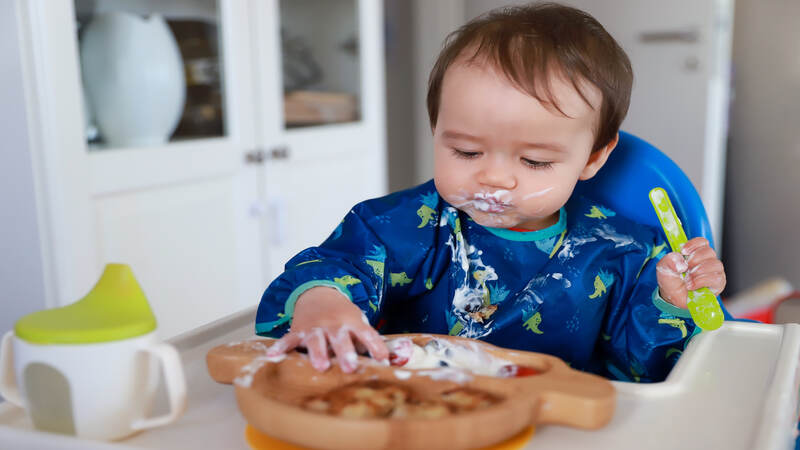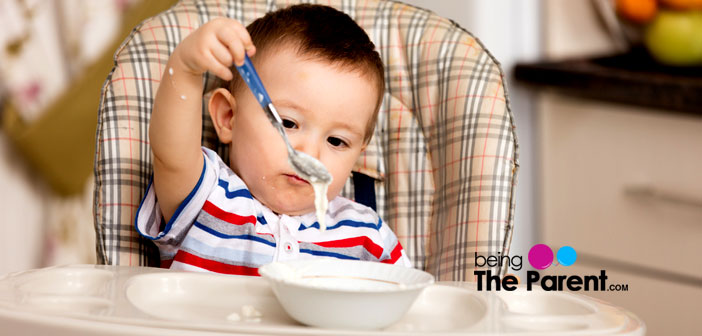
By the time your baby reaches 9 or 10 months of age, she will have, probably, settled into her sleep routines. Some of them sleep for longer periods of time and wake up once during the night, while others sleep through the night by this age. Sounds like good news to mothers! By this age your baby will have started eating solids, which is great. Since their stomach is still small, they may not eat large amounts of food timed precisely as breakfast, lunch and dinner. Babies this age still eat smaller portions well, interspersed with healthy snack times. You have a lot to consider now that your baby is between 10 and 12 months of age, and is fast approaching their first birthday.
What Should Your Baby’s Feeding Schedule Be At 10-12 Months?
Most babies have settled into an eat-sleep-play routine at this age, and they like it to be followed. If you are creating a routine keep in mind the below things:
- Your baby needs to have 20-34 ounces of milk everyday, a day comprising of 24 hours. You can introduce cow’s milk to your baby when she has her first birthday
- Your baby should be actively eating solids 3 times a day. The food doesn’t have to be boring or same, instead should comprise of a lot of variety and creativity
- She should be eating on her own, no matter how messy and so should be offered a variety of bite sized foods like vegetables, fruits, bits of poultry and chicken, and iron fortified cereals
How Would Your 10-12 Month Old Baby Like To Eat?
Milk still remains an important constituent in your baby’s diet, yet solid foods are vital for healthy development. When your baby is in the 10- to 12-month window, it is time to transition from baby foods to table foods. Also, this is the right time to wean the baby from the breast to the bottle. Setting up a healthy eating schedule, as described above, helps a lot of parents in this transition.
- Introduce an open cup and straw to your child: As shocking as this may sound, introducing liquids in an open cup at about 10 months of age has great benefits. Let the baby sip milk, water and juice from an open cup with the help of straw. It is an important developmental skill that allows your child to use the muscles inside their mouth and around it in different ways. Sipping liquids using a straw from an open cup helps the baby in their speech development and by 10-11 months of age, most children are ready to progress to this milestone. Of course, the baby chair, their shirt, and your clothes will be soiled for a couple of months after you have introduced this eating tool to them, but it is certainly worth the effort and the mess
- Encourage independence: Again, this may come as a shock but if your baby wants to eat by themselves, allow them to do so. They may want to pick things up with their fingers and chew them. They may chew tiny bits and leave the remaining portion back in the plate.They may want to hold the spoon and feed themselves, very little of which will reach their mouth. You could let them do this with a little support. They may want to push the plate away when they are not hungry. In fact, you should take the plate away at such times and bring them food when they are hungry, which will be very soon. Praise them when they get it all right. Encourage them to be independent and develop their choices and tastes early in life
- Include a variety of foods: Restricting your baby’s taste buds by offering the same kind of foods everyday would make your baby limit the likeliness towards new foods. Let your creativity flow and create colorful, interesting healthy baby recipes to keep your munchkin interested in eating. Colorful food not only appeals to the baby’s senses but also makes her open to trying new foods and experiment with them

What Should Your 10-12 Month Old Baby’s Food Be?
- What you eat: Around this time, you may want to start experimenting with feeding your baby the same kind of food that the rest of the family has. This means you may want to start feeding your baby a healthy mix of carbohydrates, proteins, vitamins and minerals through cereal, legumes, fruits and vegetables
- Infant proteins: Proteins could consist of eggs in different forms, beans, fish, meatballs, hummus, legumes and pulses pureed or as a well-ground curry. Some carb ideas for your baby include buttered bread, brown rice, eggs, bits of chicken and meat, muffins, oatmeal, pancakes, mashed potatoes and sweet potatoes, and a lot more. You can feed all kinds of fruits to your baby, as per the season
- Home-cooked meals: Just remember to serve your baby their food in baby-friendly pieces (finger foods) or coarsely-ground pastes. Your baby needs to eat fresh and unprocessed foods that have too much salt and spices. Hence, as far as possible, feed your baby home-cooked foods, canned foods for babies and fresh fruits
- Less sugars and fats: Sugary foods and fatty foods should be kept to the bare minimum as they are not healthy, and cause tooth decay. Imbibing good food habits in your baby at a tender age, pays huge dividends later in life. Stay away from empty calories like colas and processed juices and foods
- Milk treats: As mentioned earlier, reduce the amount of milk that is breastfed to the baby. Do not stop breastfeeding the baby altogether. Also, do not make up for the reduced amount of breast milk by replacing it with formula. Instead try and introduce cow’s or buffalo’s milk into their diet – and limit it to once or twice a day. This is a good time to feed the baby some delicious milk treats like paneer, cheese, custard, yogurt and the likes
This is the age when your baby’s creativity and imagination sprout. Hence, try to make food fun. Introduce different colored foods together. A small colorful juice cup can make the food set-up very interesting. You may want to use your imagination and lay out food on the plate in the shape of a landscape or a house or your baby’s most liked cartoon character. Watch with delight as your baby learns all about their foods and develops good eating habits!

